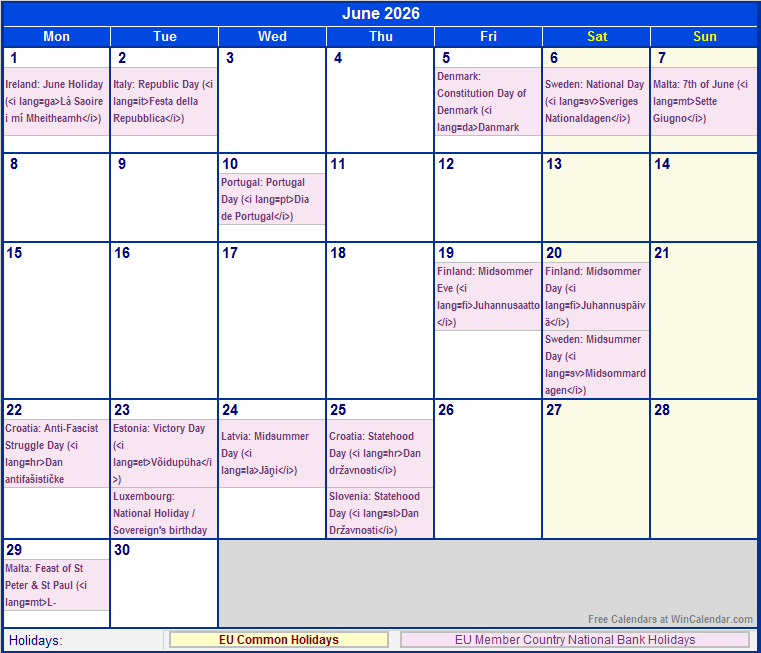Navigating The European Commission’s 2026 Holiday Calendar: A Comprehensive Guide
Navigating the European Commission’s 2026 Holiday Calendar: A Comprehensive Guide
Related Articles: Navigating the European Commission’s 2026 Holiday Calendar: A Comprehensive Guide
Introduction
In this auspicious occasion, we are delighted to delve into the intriguing topic related to Navigating the European Commission’s 2026 Holiday Calendar: A Comprehensive Guide. Let’s weave interesting information and offer fresh perspectives to the readers.
Table of Content
Navigating the European Commission’s 2026 Holiday Calendar: A Comprehensive Guide

The European Commission, as the executive body of the European Union, operates within a complex framework of regulations and policies, including those governing employee leave and holidays. Understanding the holiday calendar for 2026 is essential for both staff members and stakeholders seeking to engage with the Commission effectively. This article provides a detailed overview of the 2026 holiday calendar, highlighting its importance and offering practical tips for navigating its intricacies.
Understanding the Framework:
The European Commission’s holiday calendar is governed by a combination of factors:
- EU Legislation: The EU’s Working Time Directive sets minimum standards for annual leave, ensuring employees have a minimum of four weeks of paid holiday per year.
- Commission Regulations: Internal Commission regulations define specific holiday entitlements and procedures, including the distribution of public holidays.
- National Practices: While the EU provides a framework, specific holidays and their observance are often influenced by national traditions and practices within the Member States where Commission staff are based.
Key Components of the 2026 Calendar:
-
Public Holidays: The 2026 calendar includes a range of public holidays, observed across the EU and within specific Member States. These days are generally non-working days for Commission staff, with some exceptions based on individual department needs.
-
Annual Leave: Commission staff are entitled to a minimum of four weeks of paid annual leave, with the possibility of additional leave based on seniority and other factors. This leave can be taken in various ways, including long periods, shorter breaks, or a combination of both.
-
Flexitime and Working Hours: The Commission offers flexible working arrangements, allowing staff to adjust their working hours to accommodate personal needs and family commitments. This flexibility extends to holiday periods, enabling employees to take time off outside of traditional holiday seasons.
Navigating the Calendar Effectively:
- Early Planning: To avoid conflicts and ensure smooth workflow, staff are encouraged to plan their leave well in advance. This allows colleagues to cover responsibilities and ensures continuity of operations.
- Communication: Clear communication regarding leave requests is crucial. Staff should inform their teams and supervisors about their planned absences to minimize disruptions.
- Respecting National Practices: While the Commission provides a framework, individual departments may have specific practices regarding holiday observance. Staff should be aware of these practices and adhere to them accordingly.
- Utilizing Online Resources: The Commission’s intranet provides access to detailed information regarding holiday entitlements, procedures, and the 2026 calendar. Staff should utilize these resources to stay informed and ensure they understand their rights and obligations.
Benefits of a Well-Defined Holiday Calendar:
- Employee Wellbeing: Adequate time off contributes to employee wellbeing, reducing stress and promoting work-life balance.
- Improved Productivity: Well-rested employees are more productive and engaged, leading to higher quality work.
- Enhanced Teamwork: Planning for leave in advance fosters collaboration and ensures smooth workflow during holiday periods.
- Compliance: A clear holiday calendar ensures adherence to EU legislation and internal Commission regulations, minimizing potential legal issues.
FAQs:
- Q: Are there specific deadlines for submitting leave requests?
A: Yes, the Commission has specific deadlines for submitting leave requests, depending on the type of leave and the department’s procedures. It is essential to consult internal guidelines for details.
- Q: Can I take leave during public holidays?
A: Generally, public holidays are non-working days for Commission staff. However, some departments may require staff to work on certain public holidays based on operational needs.
- Q: What happens if I need to take leave unexpectedly?
A: In cases of unforeseen circumstances, staff can request emergency leave. However, these requests are subject to approval based on departmental needs and the nature of the emergency.
- Q: How do I access the 2026 holiday calendar?
A: The 2026 holiday calendar is accessible through the Commission’s intranet. Staff can find detailed information on leave entitlements, procedures, and the calendar itself.
Tips for Effective Holiday Planning:
- Prioritize Key Tasks: Identify critical tasks that need to be completed before taking leave to ensure smooth workflow.
- Delegate Responsibilities: Assign tasks to colleagues to cover responsibilities during your absence.
- Communicate Effectively: Keep your team informed about your leave dates and how they can reach you in case of emergencies.
- Plan for Return: Consider what tasks you need to prioritize upon returning to work and schedule time for catching up.
Conclusion:
The European Commission’s 2026 holiday calendar is a vital tool for ensuring a balanced work-life environment and promoting employee wellbeing. By understanding the framework, navigating the calendar effectively, and utilizing available resources, staff can ensure they enjoy their leave while contributing to the smooth functioning of the Commission. A well-planned and communicated holiday calendar is essential for maintaining a positive and productive work environment within the European Commission.








Closure
Thus, we hope this article has provided valuable insights into Navigating the European Commission’s 2026 Holiday Calendar: A Comprehensive Guide. We thank you for taking the time to read this article. See you in our next article!